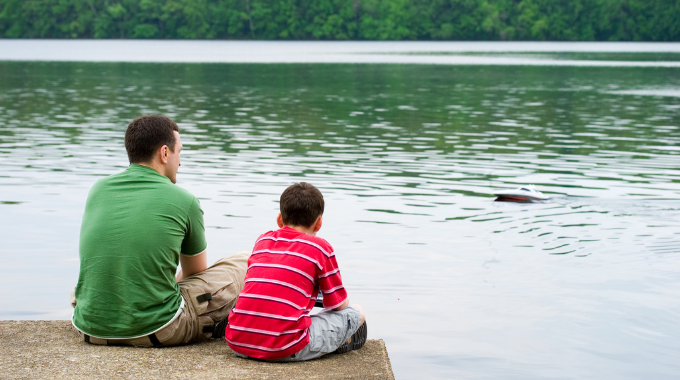The one time when you and your spouse ought to be completely united, physically and conceptually, is when telling your kids about your impending divorce. Even feuding spouses should come together at this time to achieve a united front, even if only temporary. Sending disparate messages to your children at this time can be downright damaging to them.
Tell your children first
"To no one will the change be more important than to your children; on no one will its impact be more profound." - Laura Wasser
Your children are your most important audience, and as you read this article and consider how to tell your kids about divorce, we recommend that they be the first people you tell. Really, the first. You don’t want them to find out in any other way, from anybody else.
Try not to go to extremes: Don’t slough it off and don’t expound your grievances. And certainly, don’t turn the telling into yet another competitive weapon against your spouse. This moment really does have to be about them and the change that’s coming in their lives. They are going to be okay – if you make it okay for them. The point is to show that you are there for them in this as in all things.
Prepare for their reaction, however good or bad it may be
You may need to arm yourself with advice about how and when to have this conversation with your children and about the answers you’re going to need to bring to the discussion.
The first question your children are likely to ask, for example, is why you’re splitting up, and the truth is that the two of you may have very different views on that. Yet, you’ll need an answer that balances honesty with reassurance, that expresses both in terms that are pertinent to your situation and your children, and that in some way demonstrates that you’re still a family.
Also consider the signals to look for when you have the conversation – signals about the concerns your children, depending on their age, may not be able to articulate in words. The exact content of those questions and concerns will vary, depending on their age. Preschool aged children might be the easiest to decipher. Their cognitive comprehension is limited, and the boundaries of their world are parents and self; they need to know this will not change.
Kids in the six to eight-year old range are a tougher nut to crack. The change they confront is likely to be their first experience of grief, and they may well feel angry about it. Pay attention to it as best you can, but certainly, with this age group, patience is a virtue. Older kids and adolescents presumably have better developed coping skills, but grief and anger are also possible reactions from them. They tend to be focused on their own emerging identities and will likely respond to the news of divorce in those terms.
But at any age, of course, divorce hurts kids. That is why the core message at any age is reassurance— that both of you will always love them, and that the dissolution of your relationship is not about them or in any way their fault. They are not to blame.
Consider how the divorce will impact them
At any age, your kids’ main concern is going to be how your split will affect them. Your split undermines their security – emotional and physical – and what they will be looking for from you is some reassurance: that both of you are still in their lives, that you are all still a family unit and will be forever even though you'll most likely be sharing child custody with their other parent.
The blow to their emotional security often expresses itself in worries about logistics. Where will they sleep? Will there be a bedroom for them at the other house? Who will pick them up from school? What will be the impact on their daily lives? — whether daily life means who their babysitter is or where they will study for their SATs. All their questions deserve calm, clear answers; calmness and clarity alone can go a long way toward reassuring them and providing the certainty they seek.
Set a time
Pick the right place where everyone can be comfortable. Allow no interruptions. Turn off phones, tablets, computers, televisions— all devices. Keep it simple. Let it go on as long as they need it to. Be expansive in answering their questions about what it will mean for them; show that you’ve thought about all this, that you’re concerned for them. Be honest. No mind games. No tricks. Let them know you will keep the burden off them: You will handle all the particulars; they should go on with their lives.
In every way, you want to model what you are telling them— that you have it all worked out, that you will make sure everything is okay, that you’ve got their backs.
One question worth considering is whether divorce is worse than living in a home dominated by a dysfunctional relationship. However, that debate goes, it is worth noting that dealing with divorce in some ways can teach children some lessons about life’s challenges and the need to confront them. Showing strength and support as a parent is therefore not just a way to help your kids get through the divorce; it may also show them something about assuming the mantle of adult responsibility— a foretaste of what is to come, one way or another.
For more on co-parenting after divorce, click here




Comments